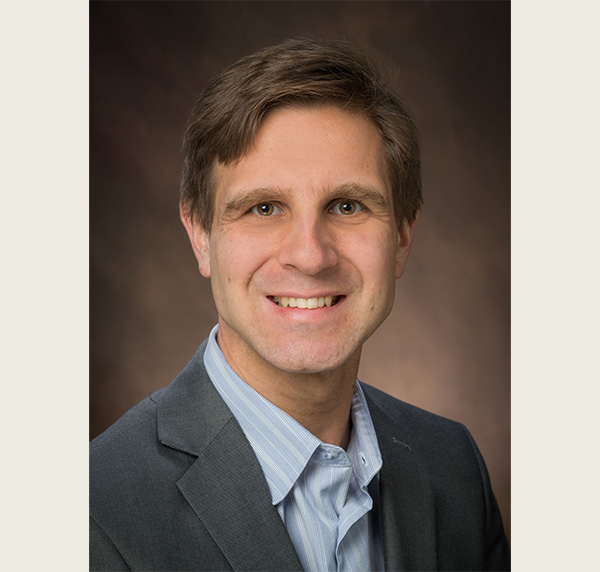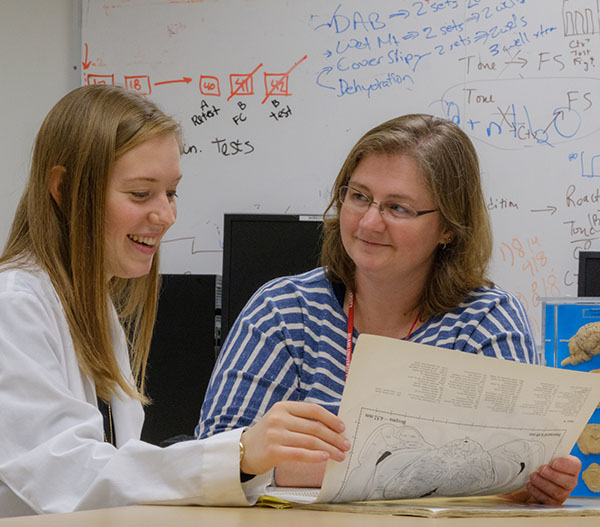Konkolewicz and Quinn receive Miami’s Distinguished Teaching Award for Excellence in Graduate Instruction and Mentoring
Dominik Konkolewicz and Jennifer Quinn were honored at a reception during the Graduate Research Forum Nov. 1
Konkolewicz and Quinn receive Miami’s Distinguished Teaching Award for Excellence in Graduate Instruction and Mentoring
Dominik Konkolewicz, John W. Steube Professor of Chemistry and Biochemistry, and Jennifer Quinn, associate professor of Psychology, each received the Distinguished Teaching Award for Excellence in Graduate Instruction and Mentoring.
They were honored at a reception during the Graduate Research Forum Nov. 1.

Konkolewicz teaches graduate courses in topical fields such as the chemistry of polymers and plastics, which is important for sustainability, and use of light in chemical processes. He teaches undergraduate courses including organic chemistry and first-year research experience courses.
He is a polymer chemist who researches responsive or “smart” polymer materials with advanced functional behavior. His research group works on bioconjugation — attaching synthetic polymers to biological molecules to modify their properties — which can be used, for example, to facilitate the processing of cellulose into biofuels.
He has received multiple awards in recognition of his research, including the Royal Society of Chemistry’s 2022 Polymer Chemistry Lectureship Award and the Miami University Faculty Scholar Award in 2023. In July 2024 he was named an American Chemical Society Fellow.
Konkolewicz currently serves as the advisor for eight graduate students, and since he joined Miami in 2014, he has mentored 13 students who earned Ph.D. degrees and 10 students who earned M.S. degrees.
He has served as the graduate director for the Department of Chemistry and Biochemistry since 2020 and has had a tremendous impact on all graduate students in the department, according to a faculty nominator. Konkolewicz “is highly effective at supporting each student from orientation to advising to ensure timely graduation,” and his innovations in modernizing the graduate curriculum have “served as a roadmap for curriculum revision at other departments at Miami,” the nominator said.
Konkolewicz’s s mentoring within his own team is outstanding within the department, according to the nominator. “The outcomes for students in his lab group are remarkable. A Miami graduate student has appeared 153 times as a coauthor of one of Dominik’s 111 Miami based publications, with 99 publications containing Miami graduate students. This level of productivity is unheard of in the department for advisors or graduate students and a testament to the efficacy of Dominik’s mentorship.”
His graduate student alumni agree, noting that Konkolewicz uses his connections in the scientific community to help his students. He encourages his students to serve as session chairs during American Chemical Society national meetings, “which is great for exposure and opens doors for prestigious postdoctoral and industrial positions after graduation,” a former student said.
“As he successfully manages all these roles, he remains committed to supporting diversity, equity, and inclusion both inside and outside of the lab and classroom,” she said.
Another lab group alumnus said, “Dr. Konkolewicz's mentorship extended far beyond the lab bench. One of the most valuable aspects of his guidance was his emphasis on developing transferable skills. He prioritized communication, whether it was through presenting at conferences, writing manuscripts early in the program, or discussing research with lab mates and colleagues across the department. This focus on communication has been invaluable in my current industry role, where conveying technical information to diverse stakeholders is critical.”
Another alumna emphasized that the diverse backgrounds of both current and former group members (over 50 students) “from a range of genders, ethnicities, religions, and cultures are a testament to his commitment to promoting an inclusive environment.”
Notably, his support during the COVID-19 pandemic lockdown was exceptional, she said. “Konkolewicz ensured that we remained actively engaged in research activities, whether through writing or computer-based projects. His continuous guidance and genuine care throughout this challenging period kept us staying on track, allowing us to achieve success, even though we were unable to conduct our usual lab-based research. His adaptability and commitment to his students' progress and health were truly commendable during this difficult time.”
One more alumnus said,” I consider Dr. Konkolewicz as one of my great role models, and I can’t emphasize enough how deserving he is for this award.”

Jennifer Quinn directs the Learning, Memory, and Emotions lab in the Department of Psychology. It is part of the Behavioral Neuroscience (BNS) Laboratories at Miami, a highly collaborative group of faculty, graduate students, and undergraduate students. She teaches courses in behavioral neuroscience and mentors both undergraduate and graduate students in her lab.
Quinn’s research interests are in the neurobiology of learning, memory, stress, and emotion. Her research aims to understand the neurobiological mechanisms underlying the long-term impacts of early life adversity on later learning, threat processing, and substance misuse and dependence.
Since she joined Miami in 2008 she has mentored seven graduate students.
Her “dedication to and innovation in teaching our neuroscience curriculum and fostering the next set of neuroscience scholars has been extraordinary and impactful,” a faculty nominator said. “However, the true impact of her teaching and mentorship happens outside of the classroom. Dr. Quinn has cultivated a culture of excellence in her lab, modeling not just how to complete and publish research, but how to effectively educate and mentor those around them. It is clear the impact Dr. Quinn has had on her graduate students’ ability to present, teach and mentor other students,” he said.
A current graduate student nominator said, “ I can confidently affirm her ability to mentor young scientists in a style that seems rare today. Through supportive communication, patience, and true passion for her work, she fosters a space to grow not only scientifically, but also personally and professionally.”
She added.” I first began working with Dr. Quinn during the COVID-19 pandemic, during which time campus was closed, I had no research to run, and I could only meet with her virtually. Dr. Quinn was always supportive, insisting on meeting weekly to maintain our new mentor/mentee relationship, and encouraging me to work on literature for my research.”
A former lab group alumna said, “Dr. Quinn is a phenomenal teacher who genuinely cares for her students. I had the privilege of serving as her teaching assistant during my graduate training for several classes. She taught me to think critically about scientific questions and supported me in finding a career path that aligned with my goals, even when it diverged from a traditional academic route.”
Quinn “ has inspired me to become an active and dedicated mentor for others, just as she has been to me.”